I could talk for hours about the estate itself; hectares upon hectares of verdant, rolling hills divided into individual pastures by miles of moss-covered, eighteenth-century stone fences, this family farm in the Eden Valley will steal your heart as it did mine. However, the more I try to describe the place for you, the more likely I am to muck it up, so I'll leave the photos to speak for themselves. (For the most part, anyway.)
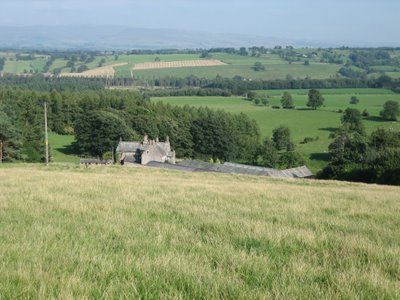 A view of the farmhouse from one of the north fields. You can see the Pennines, the "backbone of England," in the background.
A view of the farmhouse from one of the north fields. You can see the Pennines, the "backbone of England," in the background.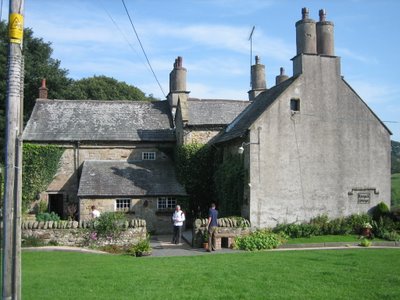 As we drove into the village, Eddie mentioned something about the kitchen being the "most recent addition" to the house. Stupid me, coming from a yuppie town where everyone gets a new kitchen every six months or so, assumed that "recent" meant "within the past few years." In a moment that only serves to remind me that America and England are two countries separated by a common language, Eddie went on to tell Jenna and I that the kitchen was 300 years old! Only five minutes later, I would find myself slurping carrot and bacon soup and sipping tea in a kitchen that was several decades older than my entire country.
As we drove into the village, Eddie mentioned something about the kitchen being the "most recent addition" to the house. Stupid me, coming from a yuppie town where everyone gets a new kitchen every six months or so, assumed that "recent" meant "within the past few years." In a moment that only serves to remind me that America and England are two countries separated by a common language, Eddie went on to tell Jenna and I that the kitchen was 300 years old! Only five minutes later, I would find myself slurping carrot and bacon soup and sipping tea in a kitchen that was several decades older than my entire country.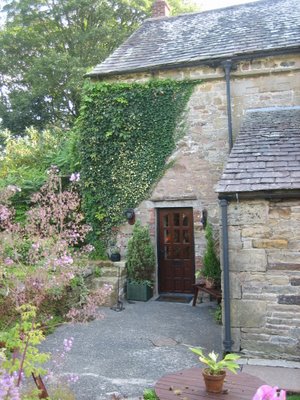 This would be the door to that kitchen, just catty-corner to a darling English sitting garden tended by Eddie's wife, Jane.
This would be the door to that kitchen, just catty-corner to a darling English sitting garden tended by Eddie's wife, Jane.As if finding out that I would be eating my morning Muesli in an eighteenth-century kitchen weren't enough to set my little historian's heart a-flutter, finding out the age of the house itself nearly sent me apoplectic.
"So, Eddie, if your kitchen is 300 years old, how old is the rest of the house?" I asked, my curiosity piqued.
"Well, the oldest standing parts of the house are the stairwell and the hearth in the great room. According to the Trust [National Trust of England], they're over a thousand years old."
One thousand years old?! ONE THOUSAND YEARS OLD?! I was going to be sleeping in an English farmhouse that had seen more than a millennium of history, more than ten centuries of human sacrifice and struggle?! Had I not been seated, my knees would have buckled, causing me to crumple into a trembling, giggling pile of sheer, geeky joy.
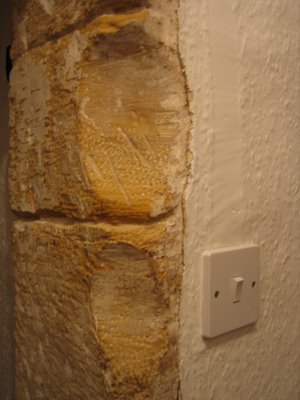 Here is the stone doorjamb leading into the one-thousand-year-old(!) staircase. See those hollows carved into the edges of the stone? That would be where some thirty generations of farmers honed the edges of their knives. (I'll try to resist the urge to say nanny-nanny-boo-boo to everyone reading...Yeah, not gonna happen. NANNY-NANNY-BOO-BOO. Hmm, I feel better.)
Here is the stone doorjamb leading into the one-thousand-year-old(!) staircase. See those hollows carved into the edges of the stone? That would be where some thirty generations of farmers honed the edges of their knives. (I'll try to resist the urge to say nanny-nanny-boo-boo to everyone reading...Yeah, not gonna happen. NANNY-NANNY-BOO-BOO. Hmm, I feel better.)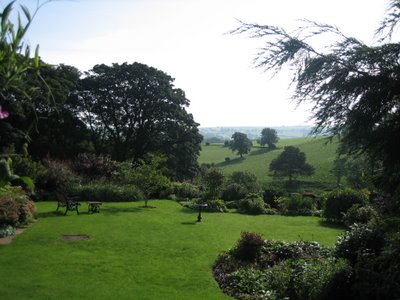 The Jacksons' backyard, also tended by Jane.
The Jacksons' backyard, also tended by Jane.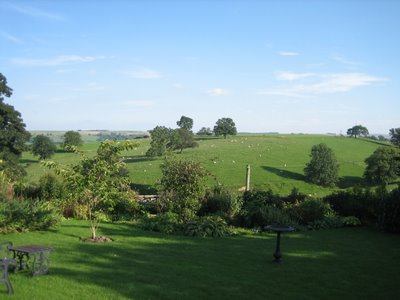 A view of the Eden Valley from the Jacksons' backyard. (Those little white dots? Yeah, sheep.) If I had local scenery like this, I'd never get anything accomplished.
A view of the Eden Valley from the Jacksons' backyard. (Those little white dots? Yeah, sheep.) If I had local scenery like this, I'd never get anything accomplished.After visiting Ullswater with the rest of our group, we asked Eddie if he would give us a tour of the sheep farm. He seemed a little taken aback, telling us that most students he had hosted weren't half as interested in seeing the sheep, let alone tending them. Oh yes, we were different. The three of us hopped on ATVs and crisscrossed the fields in the warm afternoon sun, occasionally stopping so that Eddie could point out an interesting historical site.
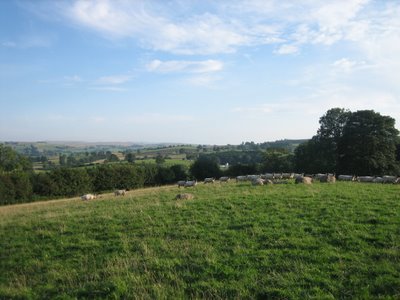 The view across one of the eastern pastures. On a semi-related note, sheep are unbelievably chatty animals.
The view across one of the eastern pastures. On a semi-related note, sheep are unbelievably chatty animals.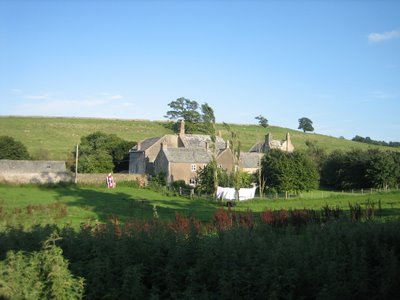 The first point of historical interest: an old farmhouse on land abutting the Jackson's property. All you Catholics and history buffs, pay close attention. This house provided refuge to one of the four knights who murdered Thomas Becket, the Archbishop of Canterbury (aka St. Thomas Becket, Thomas à Becket) in 1170. Almost fell off the four-wheeler when I heard that one.
The first point of historical interest: an old farmhouse on land abutting the Jackson's property. All you Catholics and history buffs, pay close attention. This house provided refuge to one of the four knights who murdered Thomas Becket, the Archbishop of Canterbury (aka St. Thomas Becket, Thomas à Becket) in 1170. Almost fell off the four-wheeler when I heard that one.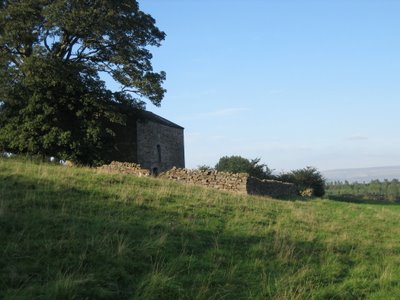 An old cottage in one of the fields on the Jackson farm.
An old cottage in one of the fields on the Jackson farm.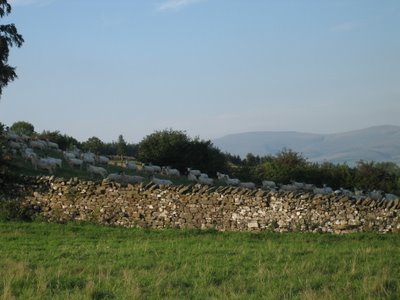 Dozens of sheep pointing north: or, a flock of woolly, bleating compasses.
Dozens of sheep pointing north: or, a flock of woolly, bleating compasses.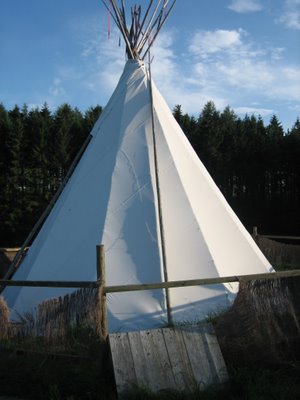 One of the Jacksons' neighbors is an artist, and being a little, um, artsy, has set up his very own Scottish tipi on his land. Yeah, that's what I thought, too.
One of the Jacksons' neighbors is an artist, and being a little, um, artsy, has set up his very own Scottish tipi on his land. Yeah, that's what I thought, too.The area of Cumbria in which we were staying is positively oozing history. Over the weekend, the Jacksons brought us to various different sites. The first one made me squeal with girlish delight. Sadly, that is no exaggeration.
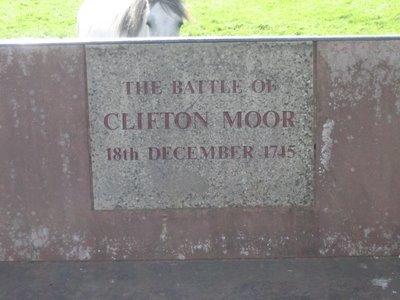 Just outside of Penrith is a monument to the Battle of Clifton Moor, the last battle fought on English soil, and one of the turning points of the Jacobite Rebellion of 1745. If you've ever spoken to me for more than five minutes, you've likely heard me gush over the "Forty-Five" or Bonnie Prince Charlie. Well, this was the site of the last battle the Highlanders fought as they were chased out of England; less than four months later, nearly 1,300 Highland soldiers would be slaughtered at the Battle of Culloden outside of Inverness in Scotland. The Battle of Culloden and the subsequent acts of proscription passed by the English destroyed Scottish clan life forever. I haven't a drop of Scottish blood in my body, and still I get riled up whenever I hear the name "Cumberland." (Confused? Look up the Duke of Cumberland.)
Just outside of Penrith is a monument to the Battle of Clifton Moor, the last battle fought on English soil, and one of the turning points of the Jacobite Rebellion of 1745. If you've ever spoken to me for more than five minutes, you've likely heard me gush over the "Forty-Five" or Bonnie Prince Charlie. Well, this was the site of the last battle the Highlanders fought as they were chased out of England; less than four months later, nearly 1,300 Highland soldiers would be slaughtered at the Battle of Culloden outside of Inverness in Scotland. The Battle of Culloden and the subsequent acts of proscription passed by the English destroyed Scottish clan life forever. I haven't a drop of Scottish blood in my body, and still I get riled up whenever I hear the name "Cumberland." (Confused? Look up the Duke of Cumberland.)To brighten the mood, I'll direct your attention to the equine face peeking over the wall.
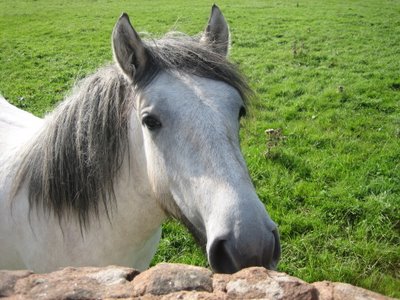 Whilst standing at the monument, we were visited by a resident of the pasture behind the stone wall. Egads, I love horsies.
Whilst standing at the monument, we were visited by a resident of the pasture behind the stone wall. Egads, I love horsies.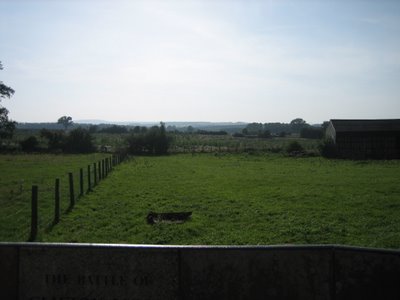 It might seem odd to find a random pony on a battlefield, but this is all that remains of Clifton Moor. Unlike Culloden, which I hope to visit in the coming weeks, Clifton Moor was not turned into a memorial battlefield, and is now serving as pastureland.
It might seem odd to find a random pony on a battlefield, but this is all that remains of Clifton Moor. Unlike Culloden, which I hope to visit in the coming weeks, Clifton Moor was not turned into a memorial battlefield, and is now serving as pastureland.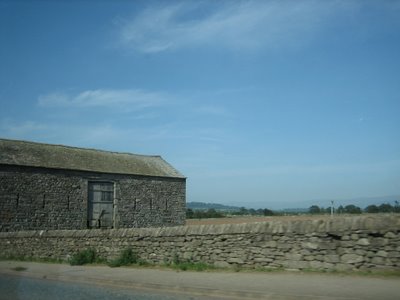 This barn, as seen from the car on the way back to Penrith, housed the wounded Jacobites following the battle. It is now protected under the National Trust and cannot be developed or altered.
This barn, as seen from the car on the way back to Penrith, housed the wounded Jacobites following the battle. It is now protected under the National Trust and cannot be developed or altered.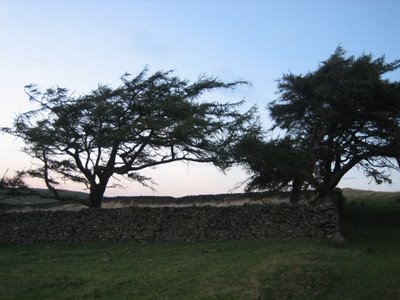 These gorgeous trees were in the ruins of a churchyard in the Howgill Fells, a group of hills in the Yorkshire Dales. We were in the Howgills visiting Fox's Pulpit, the site of the 1652 sermon delivered by George Fox that launched the Quaker movement (aka the Society of Friends).
These gorgeous trees were in the ruins of a churchyard in the Howgill Fells, a group of hills in the Yorkshire Dales. We were in the Howgills visiting Fox's Pulpit, the site of the 1652 sermon delivered by George Fox that launched the Quaker movement (aka the Society of Friends).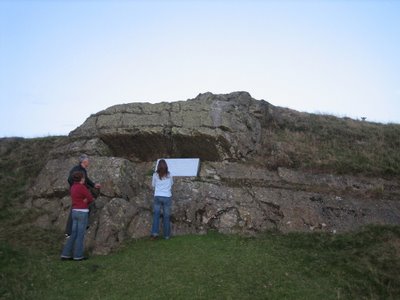 Said pulpit. The inscription on the tablet reads:
Said pulpit. The inscription on the tablet reads: LET YOUR LIVES SPEAK
HERE OR NEAR THIS ROCK GEORGE FOX PREACHED
TO ABOUT ONE THOUSAND SEEKERS FOR THREE
HOURS ON
INSPIRED HIS MESSAGE AND THE MEETING PROVED
OF FIRST IMPORTANCE IN GATHERING THE SOCIETY
OF FRIENDS KNOWN AS QUAKERS. MANY MEN AND
WOMEN CONVINCED OF THE TRUTH ON THIS FELL AND
IN OTHER PARTS OF THE NORTHERN COUNTIES WENT
THE LIVING WORD OF THE LORD ENDURING GREAT
HARDSHIPS AND WINNING MULTITUDES TO CHRIST.
JUNE 1952
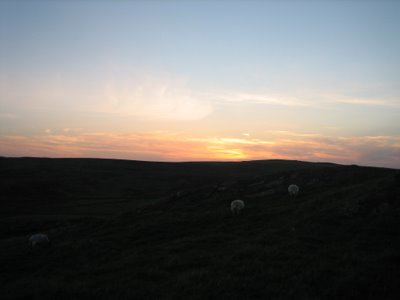 The sunset over the Howgills. Is it just me, or is everything prettier here?
The sunset over the Howgills. Is it just me, or is everything prettier here? This sheep made me giggle like an idiot when he perched on a little rock outcropping and started to bleat, not to any of his fellow sheep, but to Jenna and me. Of course, we bleated back. To do otherwise would have been rude.
This sheep made me giggle like an idiot when he perched on a little rock outcropping and started to bleat, not to any of his fellow sheep, but to Jenna and me. Of course, we bleated back. To do otherwise would have been rude.Finally, a picture from lunch on the final day in Reagill. The Jacksons brought us to their favorite pub (which had been in operation since the 1500s, naturally), and urged us to get a pudding for dessert. When I saw it on the menu, I knew I had to get it: Big Spotted Dick.
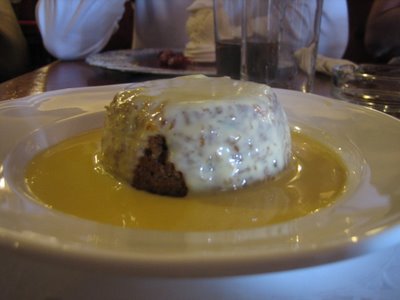 Get your minds out the gutter, you pervs. Spotted Dick is a lovely pudding filled with currants and served with warm custard. And with a name like Spotted Dick, it's gotta be good. (I'm sure the Smucker's people will sue me for copyright infringement.)
Get your minds out the gutter, you pervs. Spotted Dick is a lovely pudding filled with currants and served with warm custard. And with a name like Spotted Dick, it's gotta be good. (I'm sure the Smucker's people will sue me for copyright infringement.)Our next installment: IRELAND

5 comments:
Good gracious Kathryn...i wish I had something to tell you that would make you jealous of my semester...however...there is not a damn thing here/going on that would bring any twinge of jealousy...
I'm especially jealous of the sheep and horsies...
I love you!
Katie,
As much as I love being here, there are days (usually the rainy ones, which come often and in threes) where I'd give almost anything to be back in the States with my friends and family. The transition has been less than easy, but knowing that I have a little contact with you guys through this here blog helps make it a bit better.
Miss you like the dickens.
PS-How's Momma Eckenrod?
I have a postcard for you. Therefore, I require your mailing address. Also, I really like the sheep. As you know, sheep are my favorite animals. If you could bring one to me, I would be oh-so-appreciative. On an unrelated note, I'm going to buy tickets for Chris Thile/Edgar Meyer in January and Bela Fleck/Chick Corea in B'ham in February. If you're interested, holla and I'll hook you up. On an equally unrelated note, I hope that all is well in the Land of Scott. I knew he was a nice guy, but who knew that he had his own Land (please note that "Land" here is a proper noun, therefore making it highly fancy)? He always was modest.
Pedro :o)
p.s. my verifying word for posting this message is 'jadnogs'. *snicker*
Oh Kathryn! Your sheep owning friend couldn't hook me up with a spot of EMS over hte Easter break could he? I need to find a job lambing next March.
How's it going for you?
Ellen
Ellen,
Hey there, fellow Alabamian-cum-Scot. I don't know if the Jacksons need help lambing in the Spring, but I suppose it couldn't hurt to ask. I'll look into it for you. :)
As for things, they're awesome. I really love this goshdarned country, and am quite sad that my stay is nearly half-over. How are you loving Edinburgh?
Post a Comment